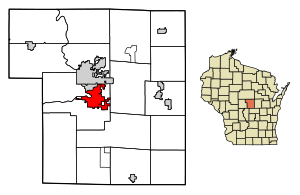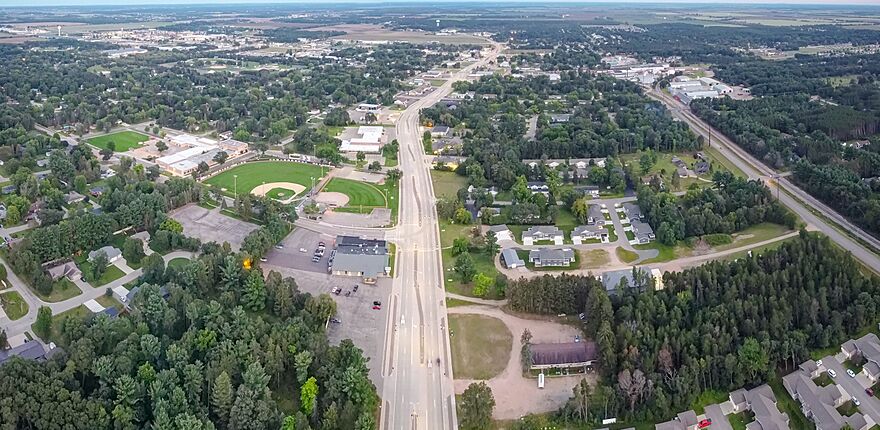Plover, Wisconsin facts for kids
Quick facts for kids
Plover, Wisconsin
|
|
|---|---|

Village hall
|
|

Location of Plover in Portage County, Wisconsin.
|
|
| Country | United States |
| State | Wisconsin |
| County | Portage |
| Settled, platted | 1844–1845 |
| First incorporation | March 6, 1857 |
| Second incorporation | March 11, 1912 |
| Third incorporation | September 28, 1971 |
| Dissolved (twice) | 1870; 1931 |
| Area | |
| • Total | 11.09 sq mi (28.73 km2) |
| • Land | 10.62 sq mi (27.49 km2) |
| • Water | 0.48 sq mi (1.24 km2) |
| Elevation | 1,070 ft (326 m) |
| Population
(2020)
|
|
| • Total | 13,519 |
| • Density | 1,273.6/sq mi (491.7/km2) |
| Time zone | UTC-6 (Central (CST)) |
| • Summer (DST) | UTC-5 (CDT) |
| Zip code |
54467
|
| Area code(s) | 715 & 534 |
| FIPS code | 55-63550 |
| GNIS feature ID | 1571681 |
Plover is a village located in Portage County, Wisconsin, United States. It's like a smaller town right next to a bigger city, Stevens Point. Plover is part of the Stevens Point area. In 2020, about 13,519 people lived there.
Contents
A Brief History of Plover
The story of Plover began a long time ago. In 1825, a special agreement called a treaty mentioned "Plover Portage of the Ouisconsin." This was a boundary point between two Native American groups, the Chippewa and the Winnebago.
How Plover Became a County Seat
In 1844, the area that would become Plover was chosen as the county seat for Portage County. A county seat is like the main town where the county government is located. At first, county business was done in a nearby community called Rushville because Plover wasn't fully settled yet.
The area was officially mapped out in 1845. It also got its first post office, called "Plover Portage." In 1850, the post office name was shortened to "Plover."
Changing Names and Dissolving Villages
In 1857, a state senator from Plover, Luther Hanchett, helped pass a law to make Plover an official village. It was first called the Village of Algernon, possibly named after a postmaster. Then, in 1858, its name changed again to the Village of Stanton. Finally, in 1864, the village was named Plover, which stuck!
However, Plover's time as the county seat ended in 1868. The county government moved to Stevens Point. After this, the village of Plover was officially dissolved, meaning it was no longer a separate village government. The area became part of the Town of Plover.
Plover's Rebirths
Plover became an official village again on March 8, 1912, after people in the area voted for it. But this didn't last long. In 1931, after another vote, Plover was dissolved again. An attempt to become a village once more failed in 1965.
Finally, Plover re-incorporated for the third time on September 28, 1971. The vote was very close! At that time, about 2,618 people lived in the village. It started with about 6.75 square miles (17 km2) of land and grew to about 7.25 square miles (19 km2) by 1981. The village has continued to grow by adding more land almost every year since then.
Today, the village president, who is like the mayor, is Tom Davies. He was first elected in 2015.
Geography of Plover
Plover covers a total area of about 11.09 square miles (28.7 km2). Most of this area, about 10.62 square miles (27.5 km2), is land. The rest, about 0.48 square miles (1.2 km2), is water.
Plover's Population
| Historical population | |||
|---|---|---|---|
| Census | Pop. | %± | |
| 1880 | 412 | — | |
| 1890 | 319 | −22.6% | |
| 1980 | 5,310 | — | |
| 1990 | 8,176 | 54.0% | |
| 2000 | 10,520 | 28.7% | |
| 2010 | 12,123 | 15.2% | |
| 2020 | 13,519 | 11.5% | |
| U.S. Decennial Census | |||
Population in 2020
According to the census from 2020, Plover had 13,519 residents. This means there were about 1,273.6 inhabitants per square mile (491.7/km2) people living in each square mile.
Most people in Plover are White (86.8%). Other groups include Asian (5.0%), Black or African American (1.3%), and Native American (0.3%). About 1.7% of residents were from other races, and 4.9% were from two or more races. About 5.1% of the population identified as Hispanic or Latino.
Population in 2010
In 2010, Plover had 12,123 people. There were 4,948 households, which are groups of people living together. About 32.7% of these households had children under 18. The average household had 2.44 people.
The average age in Plover in 2010 was 35.9 years old. About 25.3% of residents were under 18, and 11% were 65 or older.
Places of Worship
Plover is home to several churches. These include Saint Bronislava Catholic Church, Woodlands Church, and Divine Word Lutheran Church. Divine Word Lutheran Church is part of the Wisconsin Evangelical Lutheran Synod (WELS).
Getting Around Plover
Public transportation in Plover is provided by Central Transportation. This helps people get around the village and to nearby areas.
Well-Known People from Plover
- James S. Alban: A Wisconsin State Senator.
- Dennis Hall: A world champion wrestler and Olympic medalist.
- Harley M. Jacklin: Another Wisconsin State Senator.
- Robert Lampman: A well-known economist.
- Alexander S. McDill: A United States representative.
- Joe Pavelski: A professional ice hockey player in the NHL for teams like the San Jose Sharks and Dallas Stars.
- Clayton K. Slack: A recipient of the Medal of Honor.
- Walt Wilmot: A baseball player who stole 76 bases in one season for the 1890 Chicago Cubs.
See also
 In Spanish: Plover (Wisconsin) para niños
In Spanish: Plover (Wisconsin) para niños
 | Selma Burke |
 | Pauline Powell Burns |
 | Frederick J. Brown |
 | Robert Blackburn |



